|
|
This website uses cookies. By continuing to use this site you agree to accept cookies.
If you enjoy this site please consider making a donation.
Site Home
Great War Home
Search
Add Stories & Photos
Library
Help & FAQs
Features
Allied Army
Day by Day
RFC & RAF
Prisoners of War
War at Sea
Training for War
The Battles
Those Who Served
Hospitals
Civilian Service
Women at War
The War Effort
Central Powers Army
Central Powers Navy
Imperial Air Service
Library
World War Two
Submissions
Add Stories & Photos
Time Capsule
Information
Help & FAQs
Glossary
Volunteering
News
Events
Contact us
Great War Books
About
Pte. Herbert Gardiner
British Army 5th Btn Lancashire Fusiliers
from:Dark Lane Farm, Denton, Lancashire
Herbert (born 1896 ) was the son of William and Susannah Gardiner of Dark Lane Farm, Haughton Green, Denton in Lancashire. He enlisted in the 3/9th Manchester Reserve Btn and was stationed at Ashton Barracks. He was transferred to the 1/5th Lancashire Fusiliers and was sent to fight in Eygpt and later France. He was wounded at St Quentin and in later fighting at Ypres. He was transferred to the 2nd Sherwoods. He was demobilized 1919 and returned to farming.
Rfm. James Arthur Gardiner
British Army 18th Btn. Kings Royal Rifle Corps
from:58 Ormside Street, Old Kent Road, london
(d.14th Jun 1917)
James Gardiner was my great, great grandfather who served with the 18th Battalion Kings Royal Rifle Corps. All I know is that apparently (according to great nan), he was on the front line and he lay on top of his commanding officer to save his life and then he was killed. He has no grave and had his name put on the Menin Gate. I found his WW1 Medal Card and I found out he got the British and Victory Medal. Also he would have had a Memorial Plaque given to the next of kin.
I feel very proud of him because he gave his life for somebody else and I believe that he must have been a very kind and caring person. If anyone is able to find anything else out for me I would be most grateful.
Pte. James Gardiner
British Army 5th Btn. East Kent Regiment
James Gardiner served with the 5th Btn. East Kent Regiment.
Pte. James Gardiner
Canadian Expeditionary Force 52nd (New Ontario) Btn.
from:Port Sydney, Ontario
(d.7th Oct 1918)
James Gardiner was 24 years old when he was called up for service. Born in Ontario, he had come to the prairies where he staked a claim on a quarter section of land seven years earlier. He had his medical exam in Assiniboia, Saskatchewan on 29th of November 1917. The Medical Form states that he was five foot six inches with a fair complexion, grey eyes and brown hair. He was able to stay in Canada until after Christmas. He reported for duty on 10th of January 1918, joining the 52nd (New Ontario) Battalion, Canadian Expeditionary Force
James received a gunshot to his leg and thigh and died on Monday, 7th of October 1918, only 36 days before the end of the war. He is buried in the Bucquoy Road Cemetery around 9 kilometers north of Arras in France.
Cpl. John Slater Gardiner
British Army 6th Btn. Gordon Highlanders
from:42 Blantyre Street, Cullen, Banffshire
(d.21st March 1918)
John Gardiner enlisted at Aberdeen aged 19. He was killed in action on the 21st of March 1918 and is commemorated in the Arras Memorial. He was the younger son of William Gardiner, Shipbuilder & Helen Jane (nee Slater) Gardiner, 42 Blantyre St. Cullen, Banffshire. He was a Shipwright and Boatbuilder.
John's older brother L/Cpl William Gardiner died of wounds on the 26th May 1917, he is buried at Aubigny Communal Cemetery Extension.
Lt. Reginald Scott Gardiner
Australian Imperial Force 1st Australian Division
from:Australia
Reginald Scott Gardiner was born at Casterton, Victoria in 1893. A school teacher before enlisting as a private on 25th August 1914. Gardiner was made a clerk in the Divisional Headquarters, 1st Australian Division, and departed Melbourne on HMAT Orvieto on 22nd October 1914.
Gardiner went initially to Egypt, where he was promoted to corporal on 1st March 1915, and then to Gallipoli via Lemnos. He witnessed the landing at Gallipoli on 25th April 1915 from aboard one of the transport ships. Gardiner was promoted to sergeant on 24th July 1915 while serving at Gallipoli. He was transferred to Egypt on 2nd October 1915 re-joining his unit at Gallipoli on 18th October 1915. Gardiner departed Gallipoli as part of the evacuation and, on return to Egypt, was transferred to 4 Section Medical, AIF Headquarters on 22nd December 1915.
In June 1915 Gardiner was sent to England for officer training which resulted in his commission as a second lieutenant on 18th December 1916. He left for France on 16th January 1917 where he joined the 55th Infantry Battalion. According to his service record, Gardiner was "brought to notice of Secretary of State of War for valuable service rendered in connection with the war" on 24th February 1917. He was promoted to lieutenant on 22nd May 1917. While in the 55th Battalion, Gardiner served both as a signalling officer and an intelligence officer. He also spent time between 25th April and 2nd August 1918 attached to Headquarters, 14th Australian Infantry Brigade.
Gardiner left England to return to Australia on 25th February 1919. The medical history he provided on arrival in Australia indicated he was feeling fit despite the long war years during which he had suffered from influenza at Gallipoli in 1915 and was gassed in November 1917. He had not been hospitalised on either occasion. He left the Australian Imperial Force on 16th June 1919. Reginald Gardiner died on 14th November 1922.
Sgt. Richard Job Gardiner
Australian Imperial Force 7th Infantry Btn.
from:Australia
Richard Job Gardiner was born in Carlton, Victoria. Prior to the First World War he was a blacksmith's striker. At the age of 20, Gardiner enlisted with the 7th Infantry Battalion at Footscray, Victoria on 18th August 1914, He embarked on the HMAT Hororata at Melbourne on 19th October 1914 disembarking at Alexandria on 5th April 1915.
Gardiner was wounded in action three times. The first occasion was on the Gallipoli Peninsula on 22nd May 1915. The second was again at Gallipoli, on 8th September 1915 during the battle of Lone Pine. The third occasion was in France on 22nd April 1917.
Gardiner returned to Australia on 20th October 1918.
Pte. Samuel Gardiner
British Army 11th Btn. ÃÆÃ??ÃÆ?Ã?ÃÂ A Coy. Royal Inniskilling Fusiliers
(d.1st Jul 1916)
Pte. Thomas Gardiner
British Army 19th Btn. Durham Light Infantry
Served with 14th & 18th DLI SWB
Sgt. William John Gardiner
British Army East Yorkshire Regiment
from:Birmingham
My father was William John Gardiner, 1894-1941, East Yorks Regiment and his number was 9408. I have his tag. He was a bandsman. His father, William John Wentworth Gardiner, also know as ââ¬ËBuck Taylorââ¬â¢ also served as a bandsman in the East Yorks from sometime in the 1890s till 1913. My father was born in Preston Barracks in 1894 where his father was serving. He was educated for at least six years in an Army school in India. In his final exam at 14 he was rated ââ¬ËExemplaryââ¬â¢. I believe he joined up as drummer boy bandsman at age 15.
In 1914 the Second Battalion was in India, and the First Battalion did not go to France till late September. I am curious therefore how it was my father went to France on 28th August 1914. My guess is that he was at Kneller Hall when war broke out and was sent to France with another regiment, perhaps the Royal Warwicks.
He kept a diary for six weeks, but I do not know where it is. My recollection from reading it when I was very young is that he was in the Retreat from Mons and my recollection is that he told me there were 50 men left in his battalion at the end of the retreat. In the course of his battles he lost the tip of his left thumb and that impaired his virtuosity as a flautist which had been word class. Having had a typically thorough army training he could play any instrument except the harp and the piano, could compose, arrange and conduct.
He was in the Army of occupation in Germany in 1919. He and some chums were in a German Bierkeller with some German officers who had Iron Crosses. The Brits offered to buy the crosses and when that was refused, they took them. My father was, I believe, court martialled, reduced from Sergeant to Private and probably dismissed from the service.
In 1920 he took a job in the Birmingham Small Arms factory in Armoury Road, Birmingham where his father was a warder. For eleven years he also played in the evenings in the orchestra of the Alexandra Theatre, and occasionally conducted it as well as other bands and orchestras. As he was exceptionally clever, he had great success at BSA, and when BSA started making guns again after a lapse of 17 years he was put in charge of the Material Order Department, with a staff of 279. The BSA Group comprised 28 factories, employing 30,000 people, and it was given charge of another 39 factories. He was part of the team which set up production of the Browning Gun. The parts for the Bren Gun were made at a BSA factory but assembled at the government factory at Enfield. One of the Czech technicians who came over from Brno gave me some Czech coins. In the 1930s he was Secretary of the Birmingham Branch of the ââ¬ËOld Contemptiblesââ¬â¢ and I met many veterans of the BEF. Unfortunately, I my memory may gave confused their stories with my fatherââ¬â¢s.
On 19th November, 1940, his birthday, he was fire watching at the Armoury Road factory when it was badly hit, and the barrel mill, the only one in Britain, was destroyed. 53 people died. It was Birminghamââ¬â¢s fiftieth raid, I understand. My school was in the middle of a large concentration of war industries and it was damaged enough to make it unusable for a while. Another big raid followed on 21st November. The raids lasted 12 hours and I remember coming out of the shelter to see the huge glow in the sky to the North. The centre of Birmingham was ablaze. We had been in the shelter all night on 15th November too as the bombers which raided Coventry seemed to be returning over our heads. We could see the glow of their fires. No doubt the Luftwaffe was targeting the factories which made machine tools, Alfred Herbert in Coventry and BSA in Birmingham, and that important barrel mill. Luckily they used many delayed action bombs which very brave people defused. Otherwise the war would have been over, according to the BSA historian.
Bill Gardiner joined the Home Guard when it was formed and then switched to the Air Training Corps in which he was given the rank of Pilot Officer. Although only eleven I was allowed to take part in some ATC activities. In 1941 he was made manager of the BSA factory at Redditch where 2,000 workers made the Besa Gun. The stress of the rearmament programme made him smoke too much. That had dire consequence and on June 26th 1941 he died of post operative pneumonia. He was given a full military funeral. He lived long enough to learn that Hitler had invaded Russia and his response to the news was, ââ¬ËAt last we stand a chance.ââ¬â¢
Bill Gardiner was reckoned to be the cleverest of all BSAââ¬â¢s 30,000 workers.
Pte. William "Cock" Gardiner
British Army 2nd Btn. Cheshire Regiment
from:Camberwell
William Gardiner
Royal Navy Volunteer Reserves HMS India
from:Dundee, Scotland
William Gardiner served as a Blacksmith on HMS India and was held as POW.
Pte. William Gardiner
British Army 1st Btn. Middlesex Regiment
from:Reading, Berkshire
William Gardiner served with the 1st Btn. Middlesex Regiment.
L/Cpl. William Gardiner
British Army 6th Btn. Gordon Highlanders
from:42 Blantyre Street, Cullen, Banffshire
(d.26th May 1917)
William Gardiner enlisted at Keith aged 20, he died of wounds on the 26th of May 1917 and is buried at Aubigny Communal Cemetery Extension. He was the elder son of William Gardiner (Shipbuilder) and Helen Jane (nee Slater) Gardiner of 42 Blantyre St. Cullen, Banffshire. He was a Bank Clerk.
William's younger brother, Cpl John Slater Gardiner was killed in actionon the 21st of Mar 1918 and is commemorated on the Arras Memorial.
L/Cpl Albert Gardner
British Army Loyal North Lancashire Regiment
from:Darley Street, Bolton.
(d.26th Oct 1917)
The final phase of the offensive at Passchendaele Ridge began on the 9th October 1917. This was part of the final phase of the Third Battle of Ypres. On the 26th Oct 1917 the 2/4th, 2/5th, 4/5th Loyal North Lancashires as part of the 170 Brigade of the 57th Division went forward through the mud in front of the German machine guns. There were 935 casualties and among them was 19 year old Lance Corporal Albert Gardner, Great Uncle to my husband.
Pte. Alfred George Gardner
Australian Imperial Forces 33rd Btn.
from:Upper Manilla, New South Wales.
(d.7th Jun 1917)
Pte. Charles Lyall Gardner
British Army 57th Coy. Machine Gun Corps
from:Winchcombe
(d.30th Sep 1918)
Charles Gardner is named on our war memorial and we are researching biographies of these men, he appears on the second part of a list of men found in the church which begins in December 1915.
Pte. Clarence George "Bill" Gardner
2nd Btn. Middlesex Regiment
from:Enfield, Middlesex,
(d.12th November 1918)
Gnr. Daniel Gardner
British Army 153rd Brigade, A Battery Royal Field Artillery
from:Dipton, Co. Durham
(d.15th September 1918)
Gunner Daniel Gardner died of wounds at the Casualty Clearing Station at Arneke on the 15th of September 1918. He is buried at Arneke British Cemetery. He was serving with A Battery, 153rd Brigade, Royal Field Artillery.
David Milne Gardner
British Army Royal Welsh Fusiliers
from:Dundee, Scotland
David Gardner was my Father. He told me very little about the war, only that he was gassed and he was bayoneted and did receive a pension for it. He had three medals which he lost.
Pte. Edward Gardner
Britsh Army 7th Btn. Leinster Regiment
from:Daventry, Northamptonshire
(d.9th Sep 1917)
Ldg. Sea. F. C. Gardner
Royal Naval Volunteer Reserve Hawke Btn. Royal Naval Div.
(d.9th October 1918)
Leading Seaman Gardner was the son of James Gardner of 143 Wellington Bldgs, Ebury Bridge Road, Pimlico, London. He was 23 when he died at 29 Casualty Clearing Station, Delsaux. He is buried in grave I.D.5 at Delsaux Farm Cemetery, Beugny.
Lt. Frederick Lee Gardner
Royal Navy
(d.28th May 1917)
Frederick Gardner was born on 31st October 1880 the son of Francis William Gardner and Jane Stewart. Baptised at the church of Holy Innocents, Hornsey when parents were living at 15 Haringey Park. His father was a Barrister at Law and mother was the sister of a Major General.
He went to sea and gained a 2nd Mates Certificate of Competence in 1900 and 1st Mate in 1902. He was living with his parents when the censuses were taken in 1881 and 1891. At some time he enlisted in the Royal Indian Marines and on the 22nd June 1909 he married Constance Muriel Hume Barns in Chertsey, Surrey. In 1911 they were living in Seaford, Sussex and his occupation was Lieutenant Royal Indian Marines.
He died on the 28th May 1917 at Dieppe while employed on the staff of the Divisional Naval Transport Officer.
Pte. Frederick Joseph Lewis Gardner
British Army 1st Btn. Royal Newfoundland Regiment
from:British Harbour, Newfoundland
(d.28th Dec 1918)
Frederick Gardner was captured on 14th of Apr 1917 and died of grippe on 28th of December 1918 while a POW.
Cpl. George Arthur Gardner
British Army
Pte. George Frederick Gardner
British Army 9th Batallion Royal Inniskilling Fusiliers
from:Kineton, Warwickshire
(d.24th October 1918)
Hector Cameron Gardner
Royal Flying Corps 6 Squadron
Hector Cameron Gardner was my grand father born in Gateshead-on-Tyne in January 1898. He served as apprenticeship with the Austin Motor Company at Longbridge, Birmingham and then served 3 years in the RFC 6 squadron as pilot/navigator during WW1.
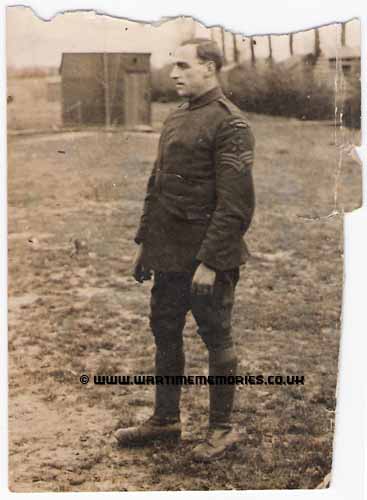
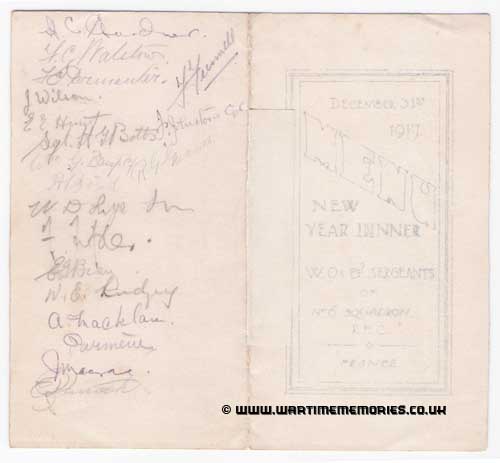
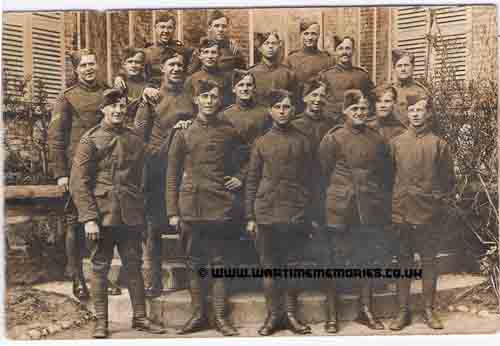
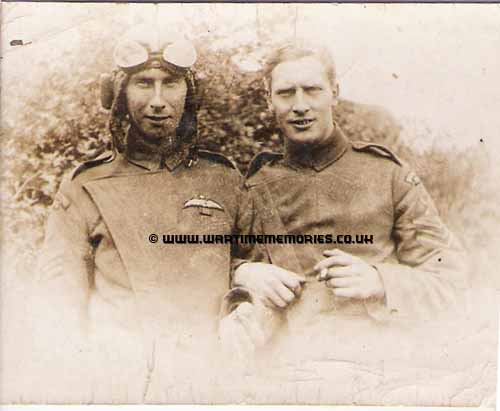
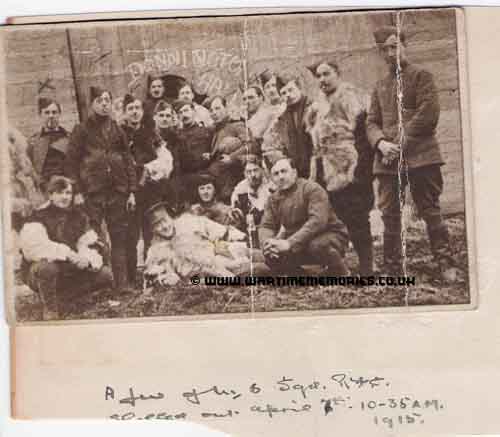
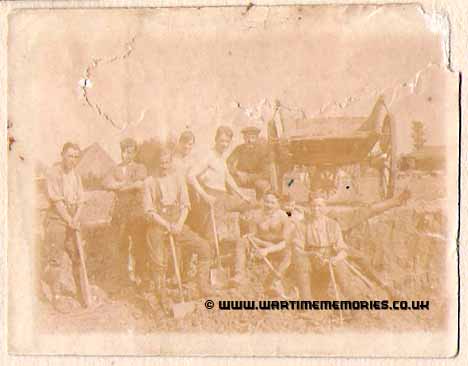
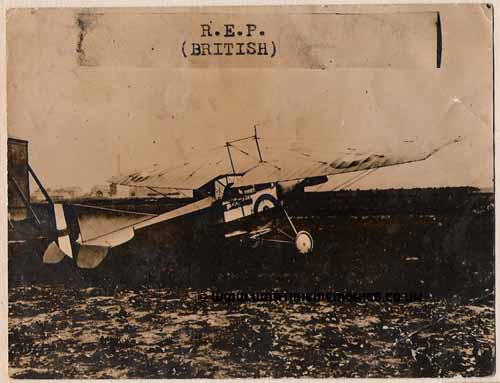
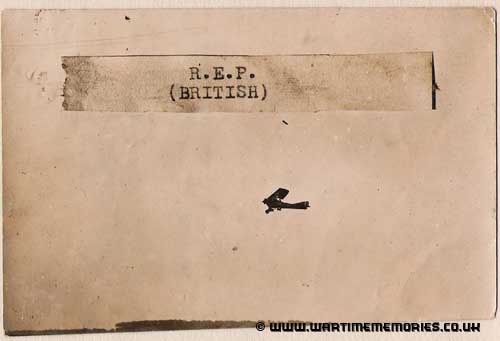
He married Dorothy Chandler in the early 1920's. Dorothy was employed in the design department of Handley Page during WW1 and was among the 40 passengers taken up on the test flight of the V1500 in November 1918.
After WW1 he found employment with the London Agents for Sunbeam cars in London. He was successful in the Motor Trade and by the early thirties was Managing Director of Dagenham Motors, Ford's London Agents. With the curtailment of the Motor Trade in the 1939-45 war, he was brought into the Ministry of Aircraft production by Lord Beaverbrook as Director of Mechanical Transport and Marinecraft Production. After WW2 he started his own company H.Cameron Gardner Ltd, operating Ferguson Tractor agents and later manufacturers of Hydraulic Loaders for agricultural tractors. He died in January 1981.
Pte. James Gardner
British Army 24th (Tyneside Irish) Battalion Northumberland Fusiliers
from:Gateshead
(d.1st July 1916)
James Gardner is named on the Thiepval Memorial
Cpl. Luke Gardner
British Army 148th Brigade Royal Field Artillery
from:Glasson Dock, Lancaster
(d.2nd Oct 1917)
Pte Matthew Gardner
British Army 8th Btn Kings Own (Royal Lancaster) Regiment
from:Overton, Lancaster
(d.9th April 1917)
Page 5 of 49
Can you help us to add to our records?
The names and stories on this website have been submitted by their relatives and friends. If your relations are not listed please add their names so that others can read about them
Did your relative live through the Great War? Do you have any photos, newspaper clippings, postcards or letters from that period? Have you researched the names on your local or war memorial?
If so please let us know.
Do you know the location of a Great War "Roll of Honour?"We are very keen to track down these often forgotten documents and obtain photographs and transcriptions of the names recorded so that they will be available for all to remember.
Help us to build a database of information on those who served both at home and abroad so that future generations may learn of their sacrifice.
Celebrate your own Family History
Celebrate by honouring members of your family who served in the Great War both in the forces and at home. We love to hear about the soldiers, but also remember the many who served in support roles, nurses, doctors, land army, muntions workers etc.
Please use our Family History resources to find out more about your relatives. Then please send in a short article, with a photo if possible, so that they can be remembered on these pages.
The free section of The Wartime Memories Project is run by volunteers.
This website is paid for out of our own pockets, library subscriptions and from donations made by visitors. The popularity of the site means that it is far exceeding available resources and we currently have a huge backlog of submissions.
If you are enjoying the site, please consider making a donation, however small to help with the costs of keeping the site running.
Hosted by:
Copyright MCMXCIX - MMXXIV
- All Rights Reserved -We do not permit the use of any content from this website for the training of LLMs or for use in Generative AI, it also may not be scraped for the purpose of creating other websites.